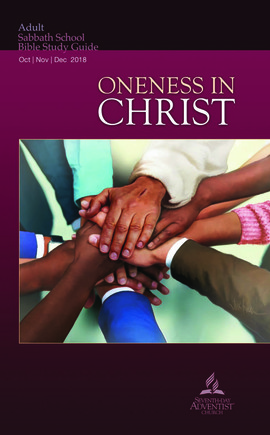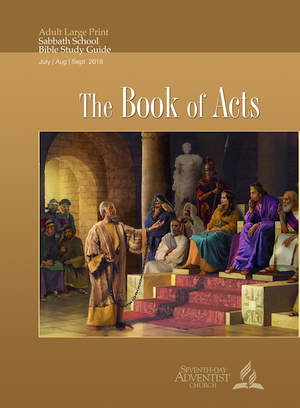Oneness in Christ
Video of the lesson presented by Pastor Doug Batchelor:
http://www.amazingfacts.org/media-library/media-archives/t/central-study-hour/sq/8/o/4/th/c.aspx
Video of the lesson presented by Dr Derek Norris:
http://hopess.hopetv.org/
The Teachers' Editions
https://www.absg.adventist.
Click on References below after the links to the lessons and before the cell phone signs for the verses of the week
This Quarter’s Study Contents: The Book of Acts – Victory of the Gospel
- Creation and Fall • Sep 28 – Oct 5


- Causes of Disunity • Oct 6 – 12


- “That They All May Be One” • Oct 13 – 19


- The Key to Unity • Oct 20 – 26


- The Experience of Unity in the Early Church • Oct 27 – Nov 2


- Images of Unity • Nov 3 – 9


- When Conflicts Arise • Nov 10 – 16


- Unity in Faith • Nov 17 – 23


- The Most Convincing Proof • NOv 24 – 30


- Unity and Broken Relationships • Dec 1 – 7


- Unity in Worship • Dec 8 – 14


- Church Organization and Unity • Dec 15 – 21


- Final Restoration of Unity • Dec 22 – 28


Oneness in Christ
Our Unity in Christ

The church is God’s family on earth: serving, studying, and worshiping together. Looking to Jesus as its leader and Redeemer, the church is called to take the good news of salvation to all people.
Number 14 of the Fundamental Beliefs of the Seventh-day Adventist Church states, in part: “The church is the community of believers who confess Jesus Christ as Lord and Saviour. In continuity with the people of God in Old Testament times, we are called out from the world; and we join together for worship, for fellowship, for instruction in the Word, for the celebration of the Lord’s Supper, for service to all mankind, and for the worldwide proclamation of the Gospel.” - Seventh-day Adventists Believe (Boise, Idaho: Pacific Press© Publishing Association, 2005) p. 163.
But what do we mean by church? Who belongs to the church? The answer to these questions depends in part on our definition of the church.
A church is certainly the local community of believers in Jesus who obey the Lord and who assemble themselves for worship and service. They can meet in house churches or in larger congregations (Rom. 16:10, 11). By church we also mean the building in which Christians assemble. But this is hardly the best definition of the church. The church is about people, not about buildings.
In the New Testament, the church sometimes is referred to as the group of believers in a particular geographical area. So, when Paul addressed the church in Galatia, he referred to many local congregations in towns and villages in that region (Gal. 1:2; see also 1 Pet. 1:1). By church we sometimes also mean a group of people who belong to a particular denomination or who call themselves by a particular name given for their beliefs and heritage.
Yet, all these definitions are incomplete. The church is the people of God all over the earth. And though Christ has faithful followers in various denominations (many of whom will in the final crisis join God’s remnant [Rev. 18:1-4]), this quarter we are going to focus on our church, the Seventh-day Adventist Church, and what unity in Christ means to us.
Fundamental Belief 14, called Unity in the Body of Christ, states: “The church is one body with many members, called from every nation, kindred, tongue, and people. In Christ we are a new creation; distinctions of race, culture, learning, and nationality, and differences between high and low, rich and poor, male and female, must not be divisive among us. We are all equal in Christ, who by one Spirit has bonded us into one fellowship with Him and with one another; we are to serve and be served without partiality or reservation. Through the revelation of Jesus Christ in the Scriptures we share the same faith and hope and reach out in one witness to all. This unity has its source in the oneness of the triune God, who has adopted us as His children.” - Seventh-day Adventist Believe, p. 201.
The purpose of this series of Bible study lessons is to provide biblical instruction on the topic of Christian unity for us as Seventh-day Adventists, who, now, as always, face challenges to that unity, and will until the end of time.
However, in the Scriptures we find numerous insights and instructions on how to live God’s gift of oneness in Christ. Those insights, those instructions about living out and expressing in our church the unity we have been given, are the focus of this quarter.
Denis Fortin is a professor of theology at the Seventh-day Adventist Theological Seminary, Andrews University, Berrien Springs, Michigan. Since joining the Theological Seminary faculty in 1994, Fortin has served also as director of the Master of Divinity program (1999-2001), associate dean (2000-2004), chair of the Department of Theology and Christian Philosophy (2006), and until recently, dean (2006-2013).

